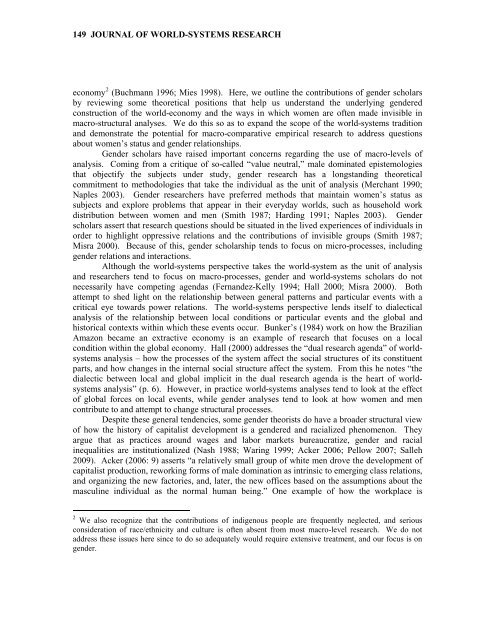Entire Volume 17 issue 1 - Journal of World-Systems Research ...
Entire Volume 17 issue 1 - Journal of World-Systems Research ...
Entire Volume 17 issue 1 - Journal of World-Systems Research ...
Create successful ePaper yourself
Turn your PDF publications into a flip-book with our unique Google optimized e-Paper software.
149 JOURNAL OF WORLD-SYSTEMS RESEARCH<br />
(Buchmann 1996; Mies 1998). Here, we outline the contributions <strong>of</strong> gender scholars<br />
by reviewing some theoretical positions that help us understand the underlying gendered<br />
construction <strong>of</strong> the world-economy and the ways in which women are <strong>of</strong>ten made invisible in<br />
macro-structural analyses. We do this so as to expand the scope <strong>of</strong> the world-systems tradition<br />
and demonstrate the potential for macro-comparative empirical research to address questions<br />
about women’s status and gender relationships.<br />
Gender scholars have raised important concerns regarding the use <strong>of</strong> macro-levels <strong>of</strong><br />
analysis. Coming from a critique <strong>of</strong> so-called “value neutral,” male dominated epistemologies<br />
that objectify the subjects under study, gender research has a longstanding theoretical<br />
commitment to methodologies that take the individual as the unit <strong>of</strong> analysis (Merchant 1990;<br />
Naples 2003). Gender researchers have preferred methods that maintain women’s status as<br />
subjects and explore problems that appear in their everyday worlds, such as household work<br />
distribution between women and men (Smith 1987; Harding 1991; Naples 2003). Gender<br />
scholars assert that research questions should be situated in the lived experiences <strong>of</strong> individuals in<br />
order to highlight oppressive relations and the contributions <strong>of</strong> invisible groups (Smith 1987;<br />
Misra 2000). Because <strong>of</strong> this, gender scholarship tends to focus on micro-processes, including<br />
gender relations and interactions.<br />
Although the world-systems perspective takes the world-system as the unit <strong>of</strong> analysis<br />
and researchers tend to focus on macro-processes, gender and world-systems scholars do not<br />
necessarily have competing agendas (Fernandez-Kelly 1994; Hall 2000; Misra 2000). Both<br />
attempt to shed light on the relationship between general patterns and particular events with a<br />
critical eye towards power relations. The world-systems perspective lends itself to dialectical<br />
analysis <strong>of</strong> the relationship between local conditions or particular events and the global and<br />
historical contexts within which these events occur. Bunker’s (1984) work on how the Brazilian<br />
Amazon became an extractive economy is an example <strong>of</strong> research that focuses on a local<br />
condition within the global economy. Hall (2000) addresses the “dual research agenda” <strong>of</strong> worldsystems<br />
analysis – how the processes <strong>of</strong> the system affect the social structures <strong>of</strong> its constituent<br />
parts, and how changes in the internal social structure affect the system. From this he notes “the<br />
dialectic between local and global implicit in the dual research agenda is the heart <strong>of</strong> worldsystems<br />
analysis” (p. 6). However, in practice world-systems analyses tend to look at the effect<br />
<strong>of</strong> global forces on local events, while gender analyses tend to look at how women and men<br />
contribute to and attempt to change structural processes.<br />
Despite these general tendencies, some gender theorists do have a broader structural view<br />
<strong>of</strong> how the history <strong>of</strong> capitalist development is a gendered and racialized phenomenon. They<br />
argue that as practices around wages and labor markets bureaucratize, gender and racial<br />
inequalities are institutionalized (Nash 1988; Waring 1999; Acker 2006; Pellow 2007; Salleh<br />
2009). Acker (2006: 9) asserts “a relatively small group <strong>of</strong> white men drove the development <strong>of</strong><br />
capitalist production, reworking forms <strong>of</strong> male domination as intrinsic to emerging class relations,<br />
and organizing the new factories, and, later, the new <strong>of</strong>fices based on the assumptions about the<br />
masculine individual as the normal human being.” One example <strong>of</strong> how the workplace is<br />
economy 2<br />
2 We also recognize that the contributions <strong>of</strong> indigenous people are frequently neglected, and serious<br />
consideration <strong>of</strong> race/ethnicity and culture is <strong>of</strong>ten absent from most macro-level research. We do not<br />
address these <strong>issue</strong>s here since to do so adequately would require extensive treatment, and our focus is on<br />
gender.





